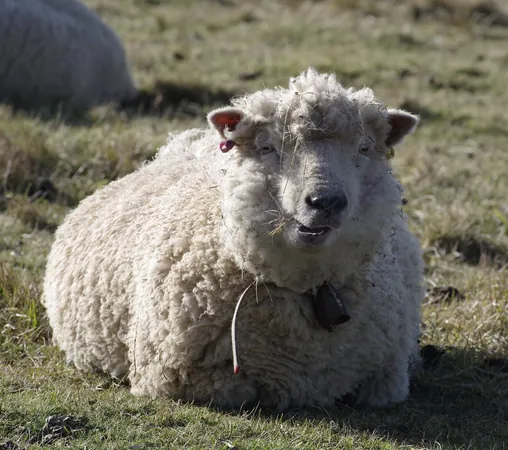
Alarming Discovery: New Bluetongue Virus Serotype BTV-12 Uncovered in the Netherlands!
2024-10-11
Author: Charlotte
Alarming Discovery of BTV-12 in the Netherlands
In a concerning development for livestock health, researchers have discovered a new variant of the bluetongue virus, dubbed BTV-12, in a sheep in Kockengen, Netherlands. This alarming find was confirmed by Wageningen Bioveterinary Research (WBVR), a vital component of Wageningen University & Research. The European Bluetongue Reference Laboratory in Madrid corroborated that the sheep was indeed infected with BTV-12, raising eyebrows across the veterinary community.
Initial Investigation and Findings
In response to this discovery, authorities at the Dutch Ministry of Agriculture, Fishery, Food Security, and Nature (LVVN) initiated further investigation into local livestock. They tested eight additional ruminants within a five-kilometer radius of the initial discovery site. In a related finding, one cow was also determined to be positive for BTV-12, with further confirmation pending from the European Reference Laboratory. Additionally, the cow, which gave birth in September, prompted follow-up testing for its calf by the Dutch Food and Consumer Product Safety Authority (NVWA).
Government Response and Testing
Given the gravity of the situation, LVVN Minister Femke Wiersma has mandated a comprehensive re-analysis of all bluetongue-positive samples collected since September 1 to verify the presence of BTV-12. The results of these critical tests are expected imminently, further emphasizing the urgency of understanding and controlling this novel strain.
Genetic Distinctiveness and Risks
Virologist Melle Holwerda, who leads the National Reference Laboratory, indicated that BTV-12 is genetically distinct from BTV-3, its predecessor, making it challenging to trace its origins. He noted, "At this point, we cannot ascertain where BTV-12 is present beyond the two positive cases we know of.” This uncertainty underscores the risk this new variant poses not just to livestock but potentially to the agricultural sector at large.
Impact on Livestock and Reporting
The bluetongue virus primarily affects ruminants, including sheep and cattle, causing serious health issues and significant economic losses. Reports of suspected infections must be communicated promptly to the NVWA to aid in the swift containment of any outbreaks.
Continued Vigilance and Monitoring
As this story develops, the agricultural and veterinary communities are on high alert, closely monitoring the situation and preparing for further investigations. Stay tuned for updates on this rapidly evolving story, as experts work diligently to mitigate the impact of this new bluetongue virus variant.









 Brasil (PT)
Brasil (PT)
 Canada (EN)
Canada (EN)
 Chile (ES)
Chile (ES)
 España (ES)
España (ES)
 France (FR)
France (FR)
 Hong Kong (EN)
Hong Kong (EN)
 Italia (IT)
Italia (IT)
 日本 (JA)
日本 (JA)
 Magyarország (HU)
Magyarország (HU)
 Norge (NO)
Norge (NO)
 Polska (PL)
Polska (PL)
 Schweiz (DE)
Schweiz (DE)
 Singapore (EN)
Singapore (EN)
 Sverige (SV)
Sverige (SV)
 Suomi (FI)
Suomi (FI)
 Türkiye (TR)
Türkiye (TR)